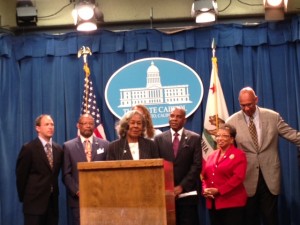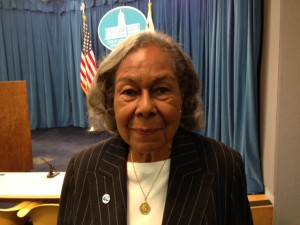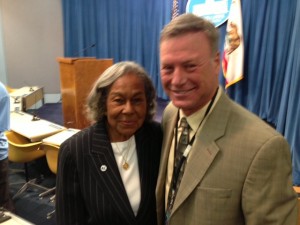I’ve had the honor of meeting Rachel Robinson twice now. The first time was in 2007 at the California Museum in Sacramento, where her late husband Jackie was inducted into the California Hall of Fame. She was energetic and a beacon of light on that cold December night. I told her we had something in common. It turns out both of us lived for many years in Stamford, Connecticut, my home town. Rachel, a California native, lived in Stamford with Jackie when he played for the Brooklyn Dodgers. Stamford is the place where I grew up, with many happy memories.
And then on Monday, I had the chance to meet Rachel Robinson again, this time at the California State Capitol. The California Legislative Black Caucus paid tribute to Robinson for her work on behalf of the Jackie Robinson Foundation, which she founded in 1973, the year after her beloved husband died.
“Of course we were devastated by his death, ” Robinson told me. “But we needed to find a way to have the legacy live on. And both he and I – and all of our family and friends who were interested in education.” She explained they knew that “education was the key to a good life.” The Jackie Robinson Foundation is a national, non-profit organization established to provide greater access to higher education for disadvantaged youth. To date the foundation has provided college scholarships for more than 1,400 students nationwide. “And we have almost a 100 percent graduation rate,” Robinson told me.
While in Sacramento, Robinson hosted a special screening of the movie, “42”, the story of Jackie Robinson’s historic rise to the Major Leagues. He was the first African American player to break the color barrier when he started for the Brooklyn Dodgers in 1947. The movie is a powerful, but painfully accurate depiction of a segregated American society, in which blacks faced oppressive racism and had to drink from separate “colored” water fountains.
But Rachel Robinson has heard from many of today’s youth who have seen the movie. “They’re horrified at some of the things they see in the movie,” she told me. “But they’re also surprised by it and then they get excited about fighting back. You know we didn’t just fade and (not) meet the challenges.” Robinson said.
Robinson has counseled kids about meeting their own challenges – everything from poverty to bullying. “So when I write back I ask them to consider what they’re doing and their own family, their own neighborhood, their own school so that they can feel positive about being able to go forward and have strength and have a good life, despite what’s in the environment.”
Jackie Robinson was an All-Star second baseman for the Dodgers, whose number 42 has now been retired by every Major League Baseball team, except for one. Mariano Rivera, an All-Star reliever for the New York Yankees, also wear number 42, but after he retires this year, the number will never be seen on a player again. “We’re very proud the number was being retired,” Rachel Robinson said.
As for Rivera, she said, “I’m meeting him for a ritual, his goodbye at Yankee Stadium next week. And I’ve been so proud of him, because he’s not only a superb ballplayer but he’s a charming good man and has carried it with dignity. And I think he’s added some special sentiment to that number.”
Over his 10-year career, Jackie Robinson was a .311 hitter with 137 home runs, 734 runs batted in and 197 stolen bases, including nineteen thefts of home. But statistics don’t begin to tell the full story. Robinson’s leadership, his courage under fire and his grace under pressure made him a perfect role model for Roy Campanella, Don Newcombe, Hank Aaron, Willie Mays, Willie McCovey and generations of African American ball players who were inspired by him.
While Robinson fought hard to integrate Major League Baseball, ironically today African Americans comprise just 8 percent of the rosters of all 30 teams — that’s roughly half the number the number from the 1970’s. It’s a fact that’s not been lost on Rachel Robinson.
“I’m sad about that,” she told me. “And I’ve talked to the commissioner about it and I’ve talked to the higher ups in baseball. They say that they’re working to change that situation and to move more people forward. But I think it’s happening too slowly and now with enough emphasis. Diversity is still a problem for us.”Rachel Robinson at age 91, is still battling for civil rights today. And judging by her reception at the California State Capitol, where she was swarmed by admirers, there’s no doubt that Rachel Robinson is making a difference.



